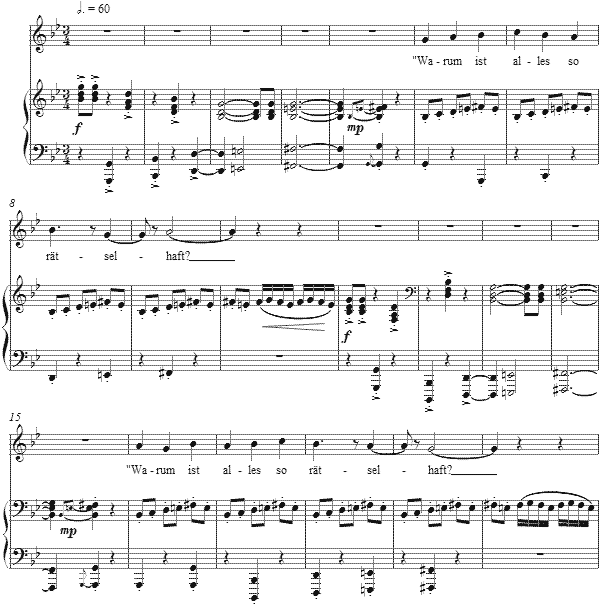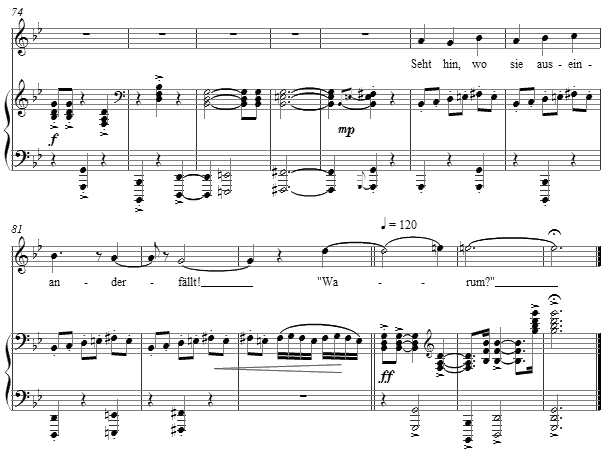Music and Texts of GARY BACHLUND
Vocal Music | Piano | Organ | Chamber Music | Orchestral | Articles and Commentary | Poems and Stories | Miscellany | FAQs
Problem - (2009)
Johann Wolfgang Goethe
for medium voice and piano
Warum ist alles so rätselhaft?
Hier ist das Wollen, hier ist die Kraft;
Das Wollen will, die Kraft ist bereit,
Und daneben die schöne lange Zeit."
So seht doch hin, wo die gute Welt
Zusammenhält!
Seht hin, wo sie auseinanderfällt![ 3 pages, circa 1' 30"]
Johann Wolfgang Goethe
Why is everything so problematic?
Here is the quarrel [ 1 ], here is the force;
The quarrel wishes, the force is prepared
And in addition one has a lovely long time.
On close inspection, where the good world comes together!
Behold, it goes to where it falls apart!
gb
The text comes from Lyrische Dicthungen, in the section noted as "1806-1810 Weimar," a four and a half year period of varying smaller works, some quite humorous. The notion of dealing with problems, seen in a contemporary light, is often spoken of as a matter for political action and one often hears politicians after their parties' decades-long period of power speak of "work yet to be done." I imagine Goethe gives us a key in this short text, for whenever the political animal seems to "fix" something, something is so often broken -- much to the job security of the "fixer" who then has an even greater "work" to do.
The setting is in an aggressive flux between triple and duple gestures within the meter, as triple plays against duple between vocal and accompaniment lines. The "Rätsel" or puzzle is figured also in the simple repetition of the vocal line backwards as a symbol for the puzzles which man sets for himself, even unwittingly.
The forceful ending repeats the interlocutor's question which Goethe has put into quotation marks before answering it with his comment. That the question is repeated is symbolic of man, whose cultures and heritage has proposed again and again well-known and clearly documented answers to many of the greatest human puzzles, the answers only to be ignored in favor of proposing the questions again and again.
The score for Problem is available as a free PDF download, though any major commercial performance or recording of the work is prohibited without prior arrangement with the composer. Click on the graphic below for this piano-vocal score.
NOTES
[ 1 ] The word, "Wollen," first means wool in German, and yet is also used in the patois as a substitute for quarreling, much in the same manner as in English one finds the phrase, "pull the wool over your eyes," meaning to confuse in a most non-literal reading.
Used in German vernacular it is "sich in die Wolle kreigen," but whether as woolen fabric or as a quarrel between things, men or nations, the metaphor remains the same. Things which we make and things which we do fall apart.
One must constantly strive to hold things together, in good repair and functional. Else "behold, where everything falls apart!" I opt for this secondary meaning as the clear message, though in both frames of reference, the conclusion Goethe offers is accurate. Whether in the working with fabric or human ideas, edges become frayed, bindings become unbound and the work falls apart. Such is the nature of things, even if this seems a seemingly cynical observation.


